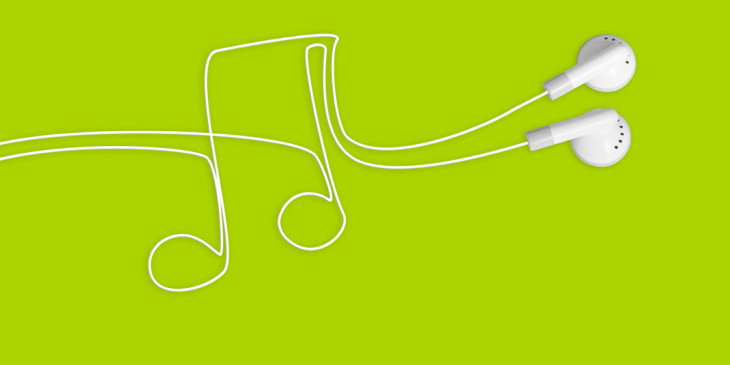Listening to music on your iPhone or iPod while working out may help you power through your workouts, but that music may also lead to premature hearing loss in your 40s.
Some hearing loss is a natural part of aging but 100% of noise induced hearing loss is preventable. Noise induced hearing loss can be the result of a noisy work environment or the noise from the lawn mower, but it also happens when you plug in your earbuds and listen to music at a high volume on your iPod or other personal listening device.
According to the National Institute on Deafness and Other Communication Disorders (NIDCD), 15 percent of people in the USA between the ages of 20 and 69 have high frequency hearing loss because they were exposed to hazardous noise levels during work or non-work activities.
“Almost everyone has some hearing loss over time and really so much has to do with your personal lifestyle. It’s whether or not you’re going to have more of a hearing loss as you age versus less of a hearing loss, says Ingrid M. Blood, Ph.D., CCC-A, professor of Communication Sciences and Disorders at Penn State.
A study by the American Speech-Language-Hearing Association showed that 34 percent of adults and up to 59 percent of teenagers who used portable music devices, listened to their music at a loud volume.
As you age, changes occur in your inner ear that may lead to age related hearing loss called presbycusis. This gradual loss of hearing though can dramatically increase due to genetics, medicine, or exposure to loud noises. These loud noises, like blasting music through your earbuds, kill the hair cells in your inner ear which are essential for hearing and balance. You’re born with a set number of hair cells in your inner ear and when they die off, new ones don’t grow.
How Loud is Too Loud?
Earbuds are like portable speakers but if people can hear the music coming from your earbuds or headphones, the volume is too high. Experts recommend that you keep noise levels below 85 decibels (dB). Exposing your ears to noises above 85dBs repeatedly and over a long period of time can lead to hearing loss.
To give you an idea of the decibel range for various noises: A whisper is rated at 30 dB, normal conversation at 60 dB, a lawn mower 90dB and an ambulance siren 120 dB. But Blood says that it’s not only the loudness or intensity of the noise in question but also the duration. The louder the volume the less time it takes for your hearing to be affected. For example, at the decibel level for the ambulance siren (120dB), it will take less than a minute for that sound to negatively impact your hearing.
Hearing Loss in Women over 40, Under 65
The NIDCD says that about one in three people between the ages of 65 and 74 has hearing loss and of those older than 75 nearly half of them have a hard time hearing. Blood says most studies focus on noise induced hearing loss among the over 65 population and adolescents, but there aren’t many focusing on noise-induced hearing loss among middle aged women.
“We really could use more information about what’s happening to the middle-aged woman,” says Blood. “It’s that middle age group we really don’t know because they’re not evaluated enough.”
Blood says that it’s easier to get data on noise induced hearing loss for adolescents because hearing tests are usually part of school health screenings.
“It’s that middle age group we really don’t know because they’re not evaluated enough so one thing that we do hear about in the clinic and in research is that whether it’s men or women, early signs of problems with your hearing may be more subtle,” says Blood. Some of these early signs include ringing in the ears (tennutis) oversensitivity to loud noises or straining to hear a conversation.
“So there are a lot of subtle indicators of hearing loss that do come up in that age group of the 30 to 50 year olds, but they’re not always being seen by an audiologist or their physician.”
What Can You Do?
Noise induced hearing loss is something you can control. Here are some suggestions on how to keep your hearing healthy into your 40s, 50s and beyond while still enjoying your music.
- Turn down the volume when listening to music with your earbuds.
- Set a volume limit for your iPod or iPhone.
- Use the 60/60 rule. Listen to music at 60 percent of your iPod’s maximum level and do it for a maximum of 60 minutes a day.
- If you tend to increase the volume on your music to drown out outside noises, opt for noise cancelling headphones instead of earbuds.
- Make an appointment with an audiologist to not only check your hearing, but also to consult about getting customized earbuds.

